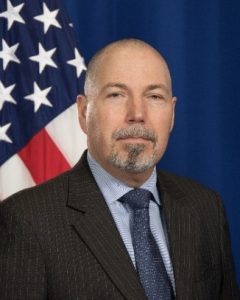This week, the US Consulate General and the CIFAR, formerly the Canadian Institute for Advanced Research, co-hosted an artificial intelligence workshop and public forum. The event was intended to explore how innovative approaches to the public policy could support the development of competitive AI strategies, while mitigating potential societal risks, such as privacy, equity, cybersecurity and labour market disruption.
“Canada in general really punches above its weight… in a number of these emerging technologies.”
– Greg Stanford
The event is connected to a broader innovation partnership between the United States government and firms in Ontario. The US-Canada Innovation Partnership, launched by the US Consulate General Toronto in October, is aimed at increasing cross-border collaboration between the neighbouring countries as well as promoting the adoption and acceleration of emerging tech and research.
Founding members of the partnership include representatives of Ontario-based innovation hubs, post-secondary institutions, and Canadian private firms. Some of these members include Yung Wu, CEO of MaRS Discovery District, Abdullah Snobar, executive director of the DMZ, EM Blake Hutcheson, president and chief pension officer at OMERS, and Garth Gibson, president and CEO of the Vector Institute. There are 22 Canadian founding partners, overall.
Notably, the partnership solely includes organizations in the Greater Toronto Area, despite being hailed as a broader partnership between the United States government and Canadian innovators.

“Canada in general really punches above its weight, relative to GDP and population, in a number of these emerging technologies.”
“I really came away with this incredible appreciation of the tech, science, and innovation ecosystem that’s being created here,” Stanford told BetaKit. “Canada in general… really punches above its weight, relative to GDP and population, in a number of these emerging technologies.”
The US is Canada’s largest foreign investor by far, focusing on Canada’s software, IT, transportation, and business services industries. In 2018, following Donald Trump’s campaign promise to renegotiate the North American Free Trade Agreement, the US, Mexico, and Canada sought to adjust how the countries would govern trade and investment, resulting in the United States–Mexico-Canada Agreement (USMCA). One provision in the USMCA is for the creation of a “digital trade chapter,” calling for the three countries to collaborate on issues like cybersecurity, spam prevention, and consumer protection.
The digital trade chapter has what prompted the US Consul General Toronto to commit to fostering cross-border research, development, and innovation collaboration. The US Consul General states this provision is what inspired the new partnership.
RELATED: Canadian VCs caught flat-footed by “insane” changes in US investment regulation
“Public policymakers are not as well-versed on these technologies (pertaining to cybersecurity, spam prevention, and consumer protection) as they should be. When it comes time to create standards or regulations around them, they do it in a way that’s not really helpful, that might impede the sort of development or application of them,” Stanford said. “The idea is to continue these public policy discussions, raising awareness about these things in a way that doesn’t impede the development and application of them, but safeguards the interest of the public.”
In an effort to better integrate the economies of Canada and the US, Stanford created the partnership as a “platform” to find organizations to connect with, as well as ways to collaborate. The partnership’s first project, a cybersecurity workshop, took place in November and was co-hosted by Stanford and Ryerson University. At the event, experts in cybersecurity, academia, and government discussed new technologies driving efficiencies in cross-border trade, cybersecurity risks, and how stakeholders are tackling these risks.
The collaboration is implementing several projects hoping to make North America more competitive in the global economy and promote a deeper bilateral relationship between the two nations.
“For the first time in history, technology advancement is outpacing the ability of humans to keep up,” said Sanjeev Gill, vice president for innovation at the University of Waterloo, another founding partner. “Increased global competition is shifting economic powers, new forms of currency and cyber warfare have emerged, our freedoms and financial systems are threatened daily, and the distribution of information is being distorted like never before. These factors and many others require multi-national collaborations.”
“The Canada-US relationship is among the world’s most significant trading relationships, and it holds special importance at this moment of technological transformation,” said MaRS’ Wu.
A ‘Canadian’ partnership focused solely on Ontario
Despite the initiative being called a US-Canada partnership, the focus in Canada is currently limited to Ontario, with some Quebec involvement.
“While our partnership is based in Toronto, many of our Canadian members, particularly those from the private sector, have countrywide responsibilities,” Stanford said when asked about why the initiative was being called a partnership between the two nations. “Our government member holds joint positions in the federal and provincial government. From the US, we are drawing on federal and state government leaders as well as private sector expertise across the country.”
“We wanted to start at the sub-national level, make sure it that the concept has merit that it gets off the ground, and can then be replicated,” Stanford added. “If you look at just what’s in the Great Lakes area in general, there’s this incredible opportunity, just here.”
The Consulate General did not make clear to BetaKit any plans to expand or repeat the program elsewhere. Stanford stated, however, his hope that the partnership will continue indefinitely, so long as it adds value.
No startup involvement
Wu, who said MaRS is proud to be a founding member of the program, noted that it will drive “significant economic growth…particularly in the startup community.”
However, several members of Toronto’s tech community have highlighted the fact that among the initiatives founding partners, none are startups. BetaKit spoke to the CEO of Toronto-based Borrowell, Andrew Graham, who said the lack of startup participation in government activities is an all-too-common theme in Canadian tech.
"US-Cda Innovation Partnership" launches w/no Cdn innovative cos in its ranks. Mainly institutions:unis, banks, Mars,Vector+Google&Cisco. The powers that be here have a habit of engaging usual suspects to talk innovation while inviting few Cdn innovators https://t.co/5JgmFgXhsb
— SeanSilcoff (@SeanSilcoff) October 30, 2019
“I think this is another example of how much Canadian public policy around innovation is dominated by foreign multinationals and other organizations who aren’t in the trenches building the next generation of innovative Canadian companies,” Graham told BetaKit.
When asked about whether the initiative would be enlisting the support or participation of startups, Stanford told BetaKit that many founding partners, like MaRS and the DMZ, do important work with startups, adding that there is “potential.”
“Working with incubators and others in the tech ecosystem isn’t a substitute for working with the companies who are actually building Canadian tech,” Graham stated. “I have a lot of respect for MaRS and the DMZ. We (Borrowell) were at the DMZ for the early stages of our life and they’re great at what they do. But being an incubator is not the same as building an innovation-based company.”
“For any policymaker who wants to foster more innovative Canadian companies, it’s crucial that Canadian innovators who are building businesses in this country be at the heart of any conversation like this,” Graham added.
RELATED: Trudeau cabinet shuffle shows slight tweaks to Canada’s innovation, economic agenda
Along with the artificial intelligence symposium, which took place this week, the US-Canada Innovation Partnership also includes a higher education mobility initiative for the Great Lakes Region, meaning eight US states as well as Ontario. The Council of the Great Lakes Region, a binational non-profit, received an undisclosed grant from the US Consulate General to help build a governance structure for the education mobility initiative.
“The Canada-US relationship… holds special importance at this moment of technological transformation.”
“The idea is to really build sort of the workforce of the future, to ensure North America has the workforce of the future, but also equally important is focusing on the workforce of today, those that have been disrupted by some of these technologies,” Stanford said.


